The Global Programme organised a state-level consultation to strengthen coordination between civil society organisations and the government for community resilience building on April 28–29, 2023, in Odisha. The consultation aimed to strengthen the coordination between civil society organisations and the government to build community resilience through sustainable climate-resilient livelihoods, disaster risk reduction, protection of income and livelihoods, disaster-resilient housing and health services, and promoting millet cultivation as a resilient crop. The consultation was aligned with the International Year of Millet 2023.
The consultation was attended by 55 representatives from civil society organisations, government officials from Odisha, the Diocese of Bhubaneswar, Balasore, Rourkela, Sambalpur, Berhampur, and Rayagada, representatives from Odisha Millet Mission Partners: NIRMAN, PRABHAT, and OPDSC, farmers from GPI project areas, and other projects of Caritas India.
The consultation opened with a short audio-visual showcasing Caritas India’s initiatives in the promotion of millets in the country. The programme began with an address by Dr. Jaison Varghese, SPL, Global Programme, who emphasised the importance of building community resilience to climate change and disasters. He highlighted the Global Programme’s role in the institutionalisation of millets as a climate-resilient crop and its planning. He also briefed on the existing millet models created by the state government and proposed the scope of replication in other areas as well.
The consultation then proceeded with a sharing by Mr. Sailendra Kumar Mohanty, Joint Director, Agriculture and Food Production Department, and the Millet Mission on the journey of the Odisha Government’s millet promotion. He stressed three aspects of millet promotion: production, procurement, and distribution. To keep the interest of the farmers in millet cultivation, the government is incentivizing farmers for a period of 5 years. He further shared that the government targets to cover 2 lakh hectors of millet cultivation in the year 2023 and declared Rs 3578 as the MSP rate per quintal for procurement of millets directly from the farmers through Mandi.
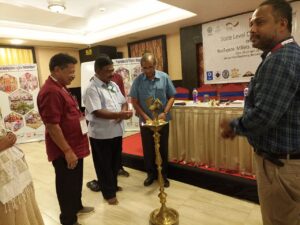
The consultation was aligned with the International Year of Millet 2023, which aims to promote millet cultivation as a resilient crop. Millet is a hardy crop that can withstand droughts and other extreme weather conditions. It is also highly nutritious and can provide a source of income for farmers. The consultation was a step towards building a more resilient and sustainable future for communities in the state.
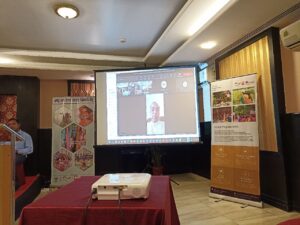
“We work in 1200 villages, out of which 60 to 70 percent are marginalised farming families, where we promote food security and nutrition programmes,” shared Fr. (Dr.) Paul Moonjely, the Executive Director of Caritas India. He further shared his vision of promoting millets as prime agriculturally resilient crops in these areas in collaboration with the government departments.
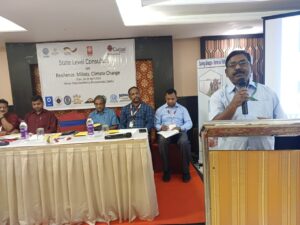
The guests from Odisha Millet Mission and OSDMA also shared their views on millet dialogues and on DRR. As the 2017 Ecosystem Model of Odisha focuses on improving productivity, processing, and distribution of millet crops, Mr. Ram Chandra Tosh, secretary of OMM, in his discussion, urged the government to also focus on the expansion of the same in Odisha for the promotion of millets in the state.
Mr. Ambika Mishra, Deputy Manager, OSDMA, talked about the enhanced capacities of community members, and district and state-level government departments to mitigate the impacts of disaster in a disaster-prone state like Odisha. He concluded with the need for diversification of crops and a climate-resilient livelihood as prerequisites for addressing climate change.
The consultation also has a special presentation from Mr. Prabal Sen, the Programme Associate – North East Zone of Caritas India, sharing the key features of millet crops and their contribution to the Sustainable Development Goals. He further suggested having millet mapping for better networking with different regions.
Mr. Bikash Kumar Pati from Water Aid emphasised ensuring access to safe drinking water and sanitation in coastal areas of Odisha during times of calamities. He indicated the inadequate infrastructural measures stated in the government policies and programmes to address the contamination of facilities and resources.
Dr. Rituja Deshmukh, a dietician from Deshmukh Hospital in Maharashtra, connected virtually and shared information on the nutritional and health benefits of millets, such as their high fibre content and boosting immunity.
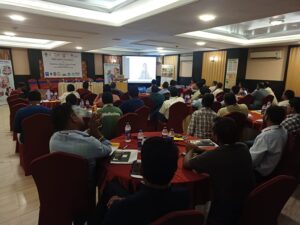
The consultation also heard from progressive millet farmers like Ms. Jija Bai, from the SABAL Programme of Caritas India, who shared her experience of shifting from cotton and maize plants to millets. It has not only saved the farming households from adverse financial losses but has also increased demand and its availability in all the ration shops in their area. A similar model was presented by another progressive farmer, Mr. Gadili Rabi, Mr. Prakash Chandra, and Ms. Anita Mallick, from Rayagada.
Fr. Lijo shared his experience with convergence with other line departments, which expanded the scope of alternative livelihoods (and reduced out-migration in the area) in animal husbandry, fishery, horticulture, soil conservation, etc. Promotion of nutrigardens, and bioflug in convergence with the fishery department, providing flood-resilient paddy varieties to farmers, and providing more than 100 chicks to support poultry farming were some of the positive outcomes highlighted.
Fr. Sushil Gouda, Director, SWAD-R, also shared about the practise of nutri gardens by 230 families, 20 farmers, 10 AWCs, 9 schools, and 15 W-SHGs. He further shared about several awareness-raising campaigns to promote the cultivation of millets and MO-Upakari Bagicha.
Dr. Jaison suggested exploring the possibilities of institutionalising the promotion of millets, wherein all the CSOs must collaborate for the cause. He further advised that the nodal NGOs and GPI partner organisations must lead in developing appropriate strategies for regular GO-NGO coordination and district-level coordination meetings. Finally, emergency resilience building and model practises at the community level must be promoted.
In conclusion, the state-level consultation organized by the Global Program on Strengthening Coordination between Civil Society Organizations and Government for Community Resilient Building was a success. The consultation brought together stakeholders from various sectors to discuss ways to build community resilience. The participants emphasised the need for a coordinated approach and pledged to work together to promote millet cultivation and improve the livelihoods of farmers.
Overall, the state-level consultation was a significant step towards building community resilience and promoting sustainable agriculture practises. The coordination between civil society organisations and the government is crucial to addressing the challenges faced by vulnerable communities. The consultation was a platform for stakeholders to come together and pledge to work towards building a more resilient and sustainable future for all.

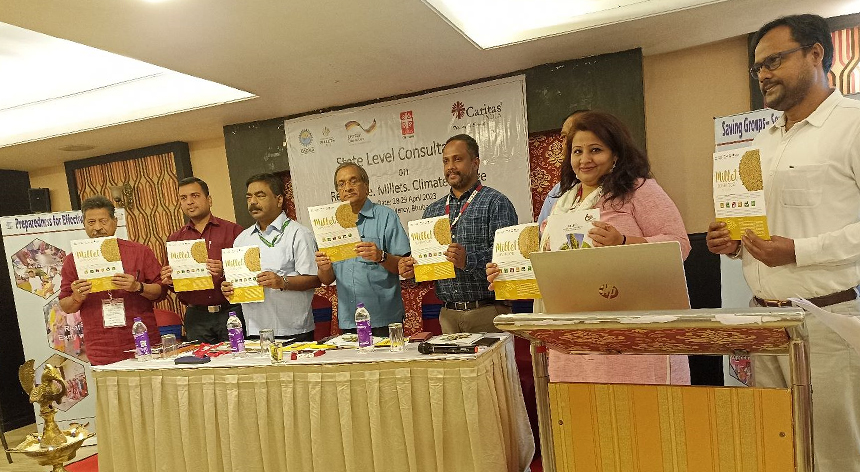
Leave a Reply